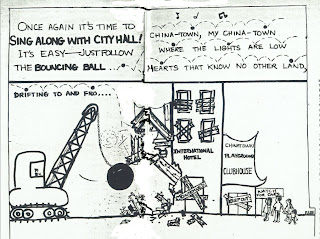
AAPA April-May Issue 1970
"Who are the people of Manilatown in San Francisco? I have walked through Kearny St. between Washington and Broadway, but the thought did not enter my mind that I had walked by the Filipino community. How can 1200 people be ignored? But yet they are. One newspaper article has called Manilatown as the 'home of the forgotten Filipino.'
The average age of the people in Manilatown is around 63 years. Many find the pool halls as their only recreation. They rely on their compadres living in this area for companionship and aid when they need it. The Manilatown Information Center and the United Filipino Hall are there, but only a few frequent themselves there.
There is another group here in Manilatown -- the youth in their 20’s and 30’s. They congregate in the late afternoon and evenings at the UFA hall, mainly to play cards and socialize. Many or these guys could not be termed “acceptable” by normal standards. Many are drop-outs, not only from school but from society as well. Some are newly arrived immigrants. All find it uncomfortable to converse in English.
Manilatown is a part of the North Beach-Chinatown target area— it is true in theory but not in fact. There is one Filipino representative on the local EOC Board. Not one position is stationed at Manilatown. Only recently the EOC has assigned one of its staff to this area, but on a part time basis. A $34,000 Manilatown proposal has been whittled down to a token. Most of this money is allocated for 2 paid staff, with little remaining for needed programs.
Interested Filipino students from…saw the need to focus attention on Manilatown. We saw a need not only to develop a long range program, but also which would be useful and concrete to the community now. We saw 4 pressing problems to this community: education, recreation, health and housing. The first objective is to determine what resources, facilities, and agencies are available in each of these problem areas. The second objective is to discover ways and means on how the Manilatown community can benefit from our efforts.
EDUCATION—-acquainting Manilatown community with such pertinent information, such as medicare, social security, welfare benefits, disability Insurance, etc.
RECREATION——handicraft sessions; bi-monthly fishing trips; movies; checkers and chess.
HEALTH——exploring possibilities for providing a free medical clinic several times a week.
HOUSING—probing into the question of better and adequate housing conditions."
Frank

No comments:
Post a Comment